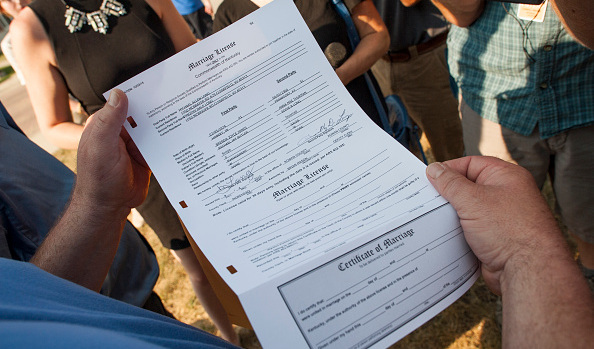Contributed by Justin Yoder
“Yes, Kim Davis is a bigot, and yes, her four marriages are relevant. But we need to be able to . . . discuss her hypocrisy without engaging in bigotry ourselves. [. . .] Should we call people out for bigoted beliefs? Absolutely. Should we make fun of the way they talk or mock them for where they’re from? No.” – from “We Need to Be Able to Call Out Kim Davis’ Bigotry Without Slut-Shaming or Hillbilly-Shaming”

(Ty Wright/Getty Images)
I found Patheos.com contributor Libby Anne’s blog post helpful in parsing out some of the issues that are at play in the aftermath of Rowan County (KY) clerk Kim Davis’ refusal to issue marriage licenses to same-sex couples. Kim Davis is a beloved child of God, as is each one of us. That simple fact should be enough to keep us from responding to her actions with hateful classist insults and sexist personal attacks; sadly, this has not been the case. The author does a great job identifying some of the inappropriate and unhelpful tactics that have been employed in responding to Kim Davis. I want to hold myself accountable to her call to refrain from sexism or classism in critiquing Davis.
I must admit that I’ve bristled to some of the calls from progressive and moderate voices for “compassion,” “respect,” and “empathy” towards Davis — not because I don’t believe in compassion, respect, or empathy, but because some of those calls have promoted a false equivalence between the systemic and sustained oppression, violence, humiliation, and injustice that LGBTQ people have historically experienced (and continue to experience even in post-Obergefell America) and Kim Davis’ experience in the wake of her actions. The Myth of Christian Persecution in the United States is alive and well, and some of the responses I’ve read have come very close to propagating it.
I can imagine that Davis experiences oppression and systemic violence in any number of ways on a daily basis, based on her particular social location. I wish that our nation were committed to providing the resources needed to secure economic justice, dismantle patriarchal systems, combat misogyny, achieve environmental justice, and undo classism. I reject the suggestion, however, that Davis’ punishment for breaking the law is itself a form of oppression, or that it is in any way analogous to the persecution and oppression of queer people that Davis herself has contributed to. I have no doubt that this situation has caused Davis pain, especially given the name-calling she’s received from outraged observers. But I object to analyses that position her as victim. I think back to a particularly astute comment made by drag performer Rory O’Neill (aka “Panti Bliss”) when he was chastised, threatened with legal action, and, incredibly, accused of “hate speech” after calling several homophobic Irish journalists “homophobes” in 2014: “[It’s] a spectacular and neat Orwellian trick,” O’Neill said. “It turns out that gay people are not the victims of homophobia; homophobes are the victims of homophobia.”
In the pleas for respect, empathy, and compassion that have come out, I hear an important reminder that Davis is a beloved child of God who does not deserve name-calling, insults, and personal attacks. I also hear a call to contextualize Davis’ behavior, to position her not as a heartless, evil bigot, but as the product of a particular culture, location, and religious tradition. I understand that impulse and by and large affirm it. I don’t think Kim Davis is malicious, or heartless, or evil. Like all of us, her worldview has been shaped by her world, and her faith tradition forms a significant part of that world. Taking that context into consideration may help us understand her better, and it might even give us pause when we’re tempted to lob hateful insults her way. But I see two major areas where caution is needed in this call for empathy and understanding:
First, attempts to explain Davis’ anti-queer position and illegal discriminatory behavior as a direct consequence of her “conservative,” “literal,” “fearful” Biblical hermeneutic (and only of that) give her simultaneously too much and too little credit for her actions.They give her too much credit because Davis is not just a Christian adhering to a particular religious tradition (inconsistent and hypocritical as that adherence may be), but also, like all of us socialized in present-day America, a person shaped by the queerphobia that pervades our entire society. Anti-gay attitudes and behaviors, even when couched in explicitly religious language, cannot be extracted from the forces of good old-fashioned homophobia, heteronormativity, and queer hatred; it’s never just about religious beliefs. They give her too little credit because a conservative hermeneutic does not automatically lead a person to the position Kim Davis has placed herself in. More and more Christians from conservative traditions have found a place for LGBTQ people within their hermeneutic, and of the ones who haven’t, very few have chosen to illegally force their beliefs on others in an attempt to effect the disenfranchisement of an entire segment of the population.
Second, and more importantly, while understanding Davis’ behavior is obviously not the same as excusing it, I think maintaining that distinction is more challenging than we might assume. I say that not to discourage attempts to empathize, extend compassion, and seek to better understand where Davis is coming from, but to reiterate several realities: Davis’ behavior is wrong and oppressive; her theology, and that of many other people of faith, actively harms queer people by promoting intolerance, persecution, rejection, discrimination, and violence; the situation for many LGBTQ people in the U.S. remains, on so many levels, in so many cases, absolutely dire. Understanding where Davis is coming from will not make her behavior any less oppressive. It won’t prevent or repair any of the harm that her theology inflicts on queer people. And it certainly won’t lessen the urgent need for justice. If we find ourselves deeming her behavior less oppressive, her theology less harmful, and the need for justice less dire, we have conflated understanding with excusing.
As a final note, I’d encourage us all to remember that extending compassion, respect, and empathy to someone who is threatening your legal rights and attacking your personhood is a tall order. It’s something I aspire to. I’m convinced it’s what Jesus would do. But it’s a tall order. I affirm the good intentions of allies calling for compassion, respect, and empathy. I hope they will bear in mind that what that requires of queer people differs considerably from what that requires of straight/cisgender people. I hope they’ll think seriously about what harm is theirs to forgive, and what harm is not. And I hope, too, that they’ll be willing to spend some time being angry, sad, and outraged with those of us for whom the hurt is more personal — especially those of us who are, like Kim Davis, people of faith.
May compassion grow. May respect prevail. May empathy flourish.
May justice come.

Amen and amen